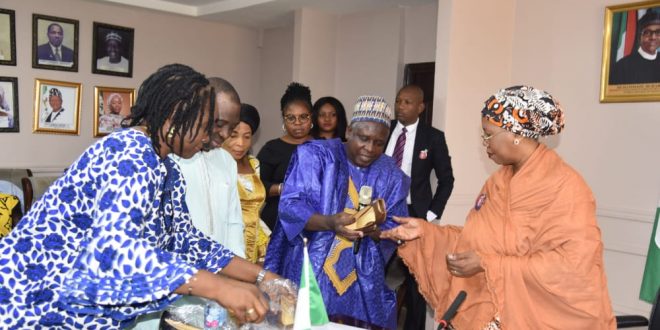The Federal Government is committed to bringing back dormant tanneries and luring more capital into the nation’s economy’s tannery industry.
Currently, just 18 out of 40 tanneries that were operational in 2000 are still in operation with a total installed capacity for processing 250,000 skins per day up to wet blue level.
The Minister of State for Industry, Trade, and Investment, Amb. Mariam Yalwaji Katagum, stated this in Abuja, during a meeting with the National Steering Committee (NSC) on the implementation of the National Leather and Leather Products Policy, led by its Chairman, Professor Mohammed Kabir Yakubu.
Katagum, according to a statement from the Ministry said that her Ministry decided, in accordance with its mandate, to start the machinery needed to revive the non-operational tanneries and draw more capital into the tannery sector.
She said, “So far the Ministry’s direct interventions to the Leather sub-sector had been limited to capital allowance on plant machinery, issuance of certificates under the backward integration programme, provision of common facilities to MSMEs operators to facilitate and strengthen expansion.”
She said the Ministry used its agencies—the Nigeria Investment Promotion Commission (NIPC), the Nigerian Export Promotion Council (NEPC), the Standards Organisation of Nigeria (SON), the Industrial Training Fund (ITF), the Small and Medium Enterprises Development Agency (SMEDAN), and the Bank of Industry ( BOI) to expand this sector of the economy.
Katagum lauded the NSC’s execution to date and said that the Committee had created strategies and action plans for implementing policy-approved measures and oriented leather industry stakeholders to the policy’s goal.
Prof. Mohammed Kabir Yakubu, Director-General of the Nigerian Institute of Leather, and Science Technology (NILEST) and Chairman of the National Steering Committee on the Strategic Implementation Plan of Leather and Leather Products Policy in Nigeria, stated in his presentation that the leather sector plays a strategic role in the country’s economic growth due to its high export earnings, job creation potential, and higher returns.
However, he noted that despite the leather industry’s significance to the national economy, it has faced difficulties that have resulted in a decline in its contribution to national GDP and a protracted lack of sector-specific policies.
Yakubu said that all the players in the leather sector in Nigeria have been able to work together more effectively because of the Leather Policy and its Implementation Plan.
He, therefore, requested additional assistance from the Ministry for the policy’s implementation of full actualization of the National Leather and Leather Products Policy Implementation Plan, with the active involvement of agencies like BOI, SON, SMEDAN, ITF, NIPC, and NEPC.
ENDS
 The Commerce Africa African Reneissance
The Commerce Africa African Reneissance


